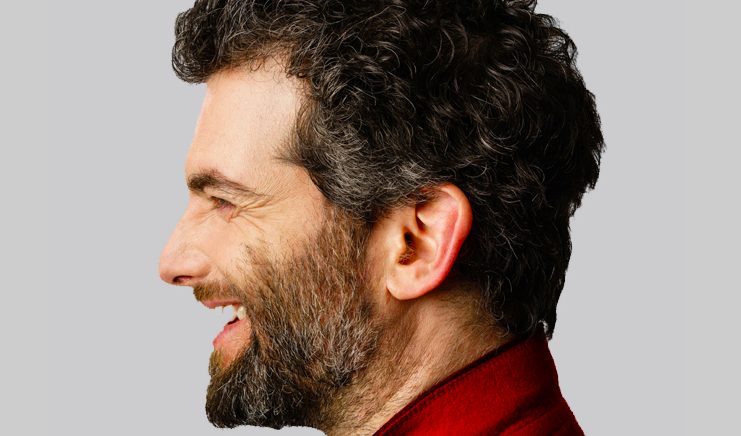Fringe veteran Dan Antopolski begins his first solo show in seven years with a whirlwind of rapid fire wordplay, surreal impressions and routines about life on the mean streets of Herne Hill. A particular highlight is Antopolski’s description of the lack of testosterone in the average Herne Hill man, giving a lacklustre verbal argument between a man and a woman as an example of this lack of masculinity. The only moments where Antopolski falters are in his concessions to topicality – a few Brexit gags and a terrorist joke feel less strong than the rest of his material. However, Antopolski’s account of appearing on children’s television enables him to cleverly reference Operation Yewtree in a way that doesn’t feel forced.
Despite the above material, the most prominent topics of the show concern Antopolski’s relationship with his daughters and how life has changed following his divorce. His joke about protecting his daughters from a hypothetical wolf attack by smearing gravy on his nether regions is an inspired piece of surreal comedy. However, it is Antopolski’s real-life routines concerning them, such as when he accidentally exposes himself post-shower to them and their friends and their reminder to him that turning forty-five (which Antopolski is about to) means that he can die of old age, that receive the bigger laughs.
Antopolski also handles the subject of his divorce with a similar lack of sentimentality, joking about how female friends visited him following the divorce to see if their husbands will survive their marriages. Despite this, however, his stories about the pre-divorce tensions between himself and his wife, particularly in front of the children, are as poignant as they are darkly humorous.
In fact, much of the second half of Antopolski’s show is noticeably more sombre in comparison to the opening gag-filled content, with Antopolski finishing with an account of clearing out his mother’s house after her death and the depersonalising effects of that action. Antopolski mentions earlier that he has been receiving therapy, which he jokes is basically having a moan, and the effects of this can be seen his open discussion of his deteriorating relationship with his wife and how his mother’s death affected him. Lesser comics would struggle with this tonal shift, but Antopolski prevents these elements from becoming overly maudlin and heavy-handed, managing to work jokes about anal and a running joke about his manhood into these more serious passages, proving correct the old saying that there’s comedy in tragedy.
The Return of Dan Antopolski marks the return of a Fringe veteran in a first-rate show that expertly combines traditional punchline humour with more reflective observational material.
